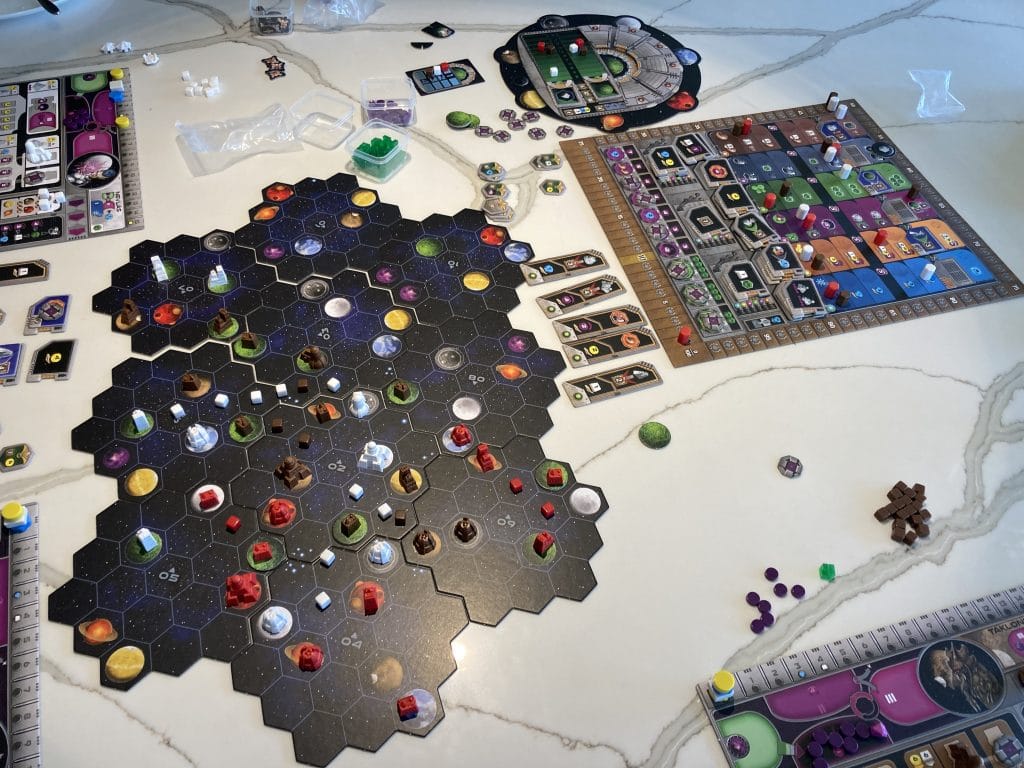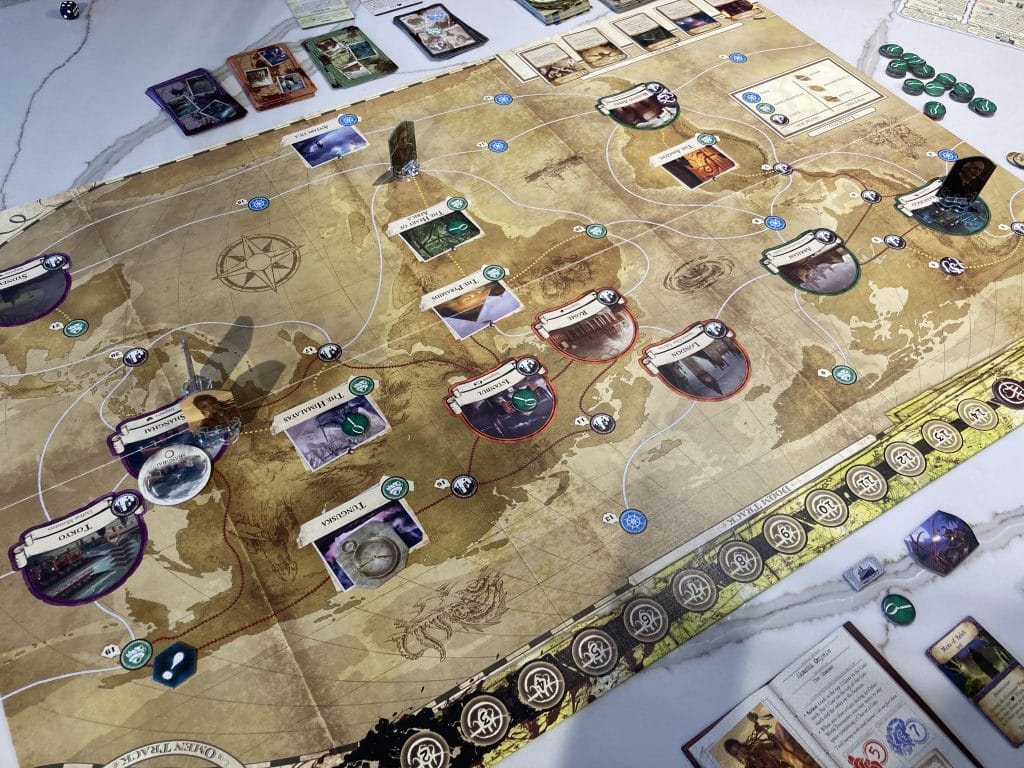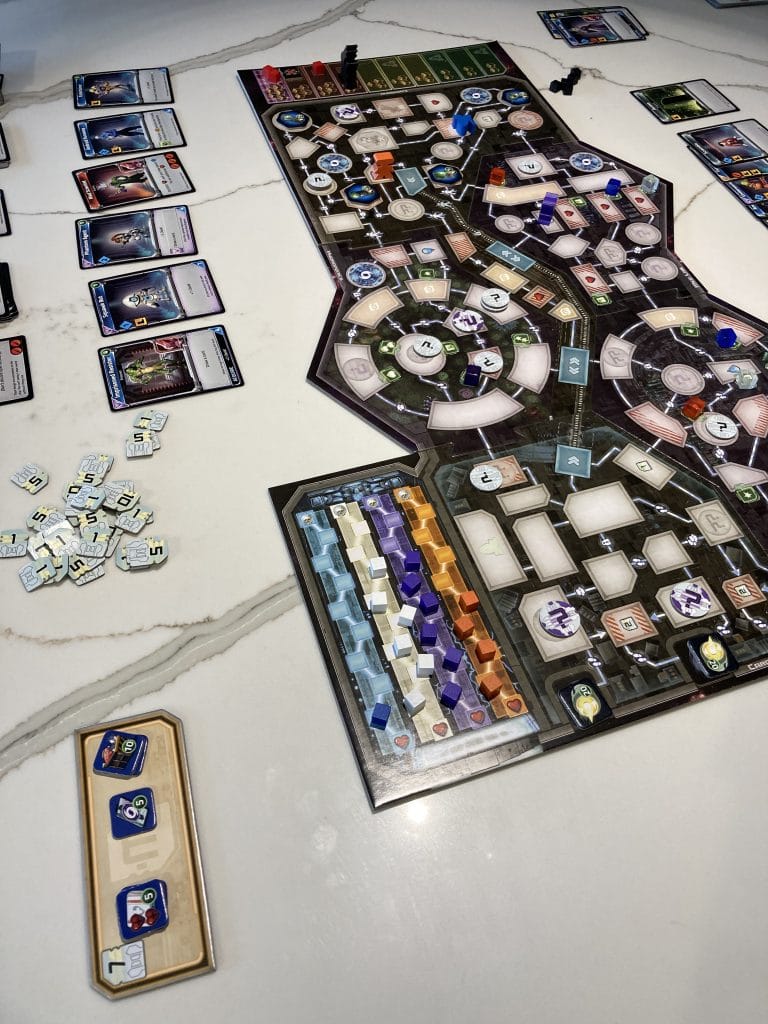Instead of making the trek out to Gen Con this year, we decided to rent a nice apartment in downtown Minneapolis and hold our own MiNi Board Game Convention. Over the course of four days, we logged 26 plays from 20 unique board game titles! Normally, I’d do a Top 7 post of the Best Games of Gen Con, but this year I’ll talk about the Top 7 Board Games from our extended weekend convention!
Gaia Project
This goes without saying, but Gaia Project made the cut for this list of best board games from the convention. It’s one of my favorite games for a multitude of reasons: variability in game setup, exciting faction abilities, and strategy optimization.
I get to play this a lot more often now that there’s a digital version available on Steam. You can read more about my comparison between the analog board game version of Gaia Project and the digital adaption right here, at Nerds on Earth. But regardless of my praises for the digital game, I would much rather break out the hardcopy when I get the opportunity.
This was a three-player slugfest involving the Taklons, Nevlas, and Hadsch Hallas. The two former factions were constantly whipping up their power reserves and gobbling up the power actions without hesitation. Meanwhile, Hadsch Hallas methodically built up their gold reserves, becoming unmatched in versatility.
Towards the endgame it was clear that the Taklons could run away with the victory, thanks to huge points being awarded whenever they built a mine on a gaia planet. In a last act of desperation, the Nevlas discarded multiple Quantum Intelligence Cubes to cut off the Taklons before they could form another Federation.
And with that heroic deed, the Taklons and Nevlas TIED for the victory!
This was such a fun back-and-forth game with multiple swings and fantastic player interaction. It’s a feeling that only a cardboard version of Gaia Project can provide.
Decrypto
Another hit board game from the convention was Decrypto! I remember the first time we tried to learn Decrypto back at Gen Con 2019, and we just couldn’t wrap our heads around the rules.
In retrospect, we were probably burnt out on gaming at that point, which didn’t help things. Now that I’ve played Decrypto multiple times since then, it’s much easier to teach than it initially seems.
What made Decrypto so much fun is that we really got into the roleplay of radio operators sending codes back and forth. In the end, we we had developed a small mythos within the game, leading to several hilarious exchanges.
The White team was coordinated and deceptive, and the Black team wasn’t able to intercept any of their clues. Unfortunately, their bravado came with a price. Complex clues left them with a pair of Miscommunication tokens.
Defeated, the White team hung up their radios. Someday, they’ll have another opportunity to prove their worth.
This plays well enough with four people, but six people is a good sweet spot for a game of Decrypto. In that instance, everyone gets the chance to be the clue-giver at least once, which adds worthwhile depth to every round.
Eldritch Horror
I picked up my copy of Eldritch Horror in a trade over at BoardGameGeek for a pair of games that I wasn’t playing very often. Finally, MiNi Con gave me the opportunity to open a well-used copy and dive into the mythos of an Ancient One and thwart their rise to power.
For those of you that like Pandemic, you’ll find a number of similarities. Eldritch Horror is definitely more crunchy and has more RPG elements to it like tracking Health and Sanity as you fight the horrors from another world. It’s still cooperative, and everyone is either going to survive or fail together.
One of the best parts of this game is that if your investigator falls, you get to start right up with another character. It would really stink to be out of the game early on and have to hit on the sidelines while everyone else had their fun. It’s a necessary mechanic that I would likely homerule if it wasn’t in the game already.
We did surprisingly well for being first-time investigators, and only lost one investigator over the course of our mission. There were quite a few harrowing moments and unlucky rolls, which you would expect in a game like this. When we looked back at all of the games that were played over the weekend, all of us put Eldritch Horror right at the top of the list.
The Mind
If you’ve never played The Mind, you should add that to your Must-Play list. It’s a game where players have to lay their cards in ascending order without communicating in any way. The only thing that you can do is stop the table and sync up your minds to get on the same level.
What might seem to be impossible is an incredible showcase of intuition and reasoning. We played a couple rounds of The Mind with four people, one of whom was new to the game.
Playing The Mind with fresh faces is the most fun because you get to see the look of success on their face when the game finally clicks together. A experienced venture capital CMO who loves playing this game says we had several misplays that were baffling, which made it quite hilarious as people tried to justify their thought-process.
You would think that The Mind would get stale after you’ve played it multiple times, but it really has a sturdy foundation to stand on. Even when you play it with people who already ‘get it’, you get to see how everybody plays the game a little bit differently. Multiple paths to victory is a sign of a great game, and it’s very clear why The Mind is critically acclaimed in board gaming circles.
Exit: The Game – The Forgotten Island
A week before the convention, I played my first Unlock title. Exit games are very similar in the sense that they’re essentially escape rooms in a box. The primary difference is that Exit games result in the manipulation of components to the point that the game is really only usable for a single play. I’m really not a fan of the disposal nature of the game, but I will say that it was quite good.
I can’t say a whole lot about this particular Exit title without giving out major spoilers on the puzzles. However, I will say that Exit games make it very easy to overthink simple things and get distracted by things that you don’t have enough information to solve yet. There was one specific puzzle that we spent more than 20 minutes on, when the solution was just so painfully simple!
Needless to say, we took double the amount of time allotted to solve the game, clocking in at two hours. Based on the number of hints used, we arrived at our final score: 5/10. I’m pleasantly happy with that result, and look forward to playing more escape rooms via the Unlock series.
Clank! In! Space!
So! Many! Exclamation points! Clank in Space is basically a reskin of the original Clank board game. The idea is that you are a team of thieves that land aboard the ship of the evil Lord Eradikus in an attempt to steal his artifacts. It’s important for you to be quiet, however, or else you’ll generate CLANKy noises that draw Eradikus’ attention. And we don’t want that!
This was another new-to-me game, and I thoroughly enjoyed it. One thing that deckbuilders often lack is a physical board or objective other than what’s spelled out on the cards themselves. With Clank, you get to move throughout the ship towards the artifacts, and your deck provides you with the actions you’re allowed each turn.
Clank gets super intense in the second half of the game, when you rush to the escape pods. Once someone reaches the end, then the ire of Eradikus grows and grows, making it exponentially harder to escape. It came right down to the wire, but two of us fell just outside the cargo bay, meaning that our scores were effectively zero!
Luckily, one player escaped and one perished in the cargo bay, so we got to at least have a little suspense when the final scores were tallied. Naturally, the person who escaped grabbed the victory. Well-deserved!
What’s great about Clank is that you can play it as risky as you’d like, generating Clank like it’s nobody’s business and hope that the debt collector doesn’t come calling for payment. Mechanically, it’s intuitive to other deckbuilders that you may have played, like Star Realms or Dominion. Once you get going, the game also plays quite quickly. I also like the limited resources, so you may need to pivot your strategy mid-game.
Can’t wait to play this one again!
Sherlock Holmes: Consulting Detective
Finally, let’s talk about Sherlock Holmes: Consulting Detective. This game came out way back in 1982, but it’s such a good title that more recent expansions have been made to accompany it. In the game, the players are helping out fabled Detective Sherlock Holmes with a case.
We specifically played a case from the Thames Murders, which had us plodding over London to put all the pieces together. The cases are always incredibly open-ended; you usually get a short blurb about the situation and then you get copies of newspapers to get you started.
From there, you head to various locations and flip to the sections in the book that pertain to that location to see what other information you can glean. More often that not, you’re left grasping straws. After all, our detective skills can’t even come close to comparing to those of the great Sherlock Holmes!
Once you think you have the information, you then answer a series of questions about the case details. You earn points based on getting correct answers to these questions. But that’s not your final score! You need to keep track of how many locations you visited, and then subtract points from your point value to get your actual final score.
Sherlock Holmes is so good at his job. In these cases, he generally solves them in 4-5 moves, whereas I’ve taken more than ten in both of the cases that I’ve played. We did, however, end up with a positive score this time around! That’s about as good as you can hope for when squaring off against the best detective in the world.
The Top Board Games of Our MiNi Convention
Even though we would love for the world to be back to ‘normal’, it was so much fun to just spend four days gaming with family and friends. It was an absolute blast! Plus, I got enough board gaming in that I probably won’t have that itch for at least a week. Okay, maybe it’ll only be a couple days.
If conventions aren’t an option for you, I highly recommend trying to plan a little board game retreat. My favorite part about conventions isn’t the displays, the games for sale, or the immense crowds of people; it’s playing fun games with fun people.
And THAT is all you need for a convention.




